How AI and Blockchain Development Services in UAE Are Powering the Future of DeFi
October 03, 2025
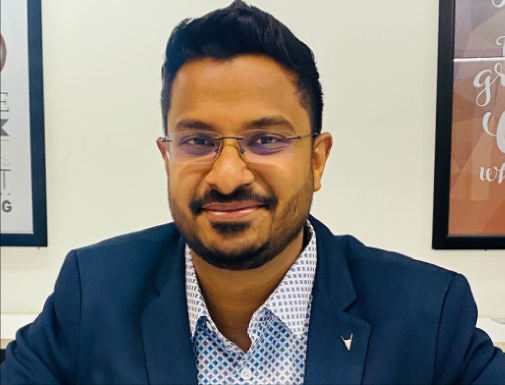
Ayush Kanodia
.jpg?w=1920&q=75)
The UAE is emerging as one of the world’s most ambitious DeFi innovation hubs, where technology meets regulation head-on. In this environment, AI and blockchain development services in UAE are not just powering new products, they’re shaping the next generation of compliant, data-driven finance.
As global businesses rush to tokenize assets, launch decentralized exchanges, and build on-chain lending platforms, the UAE’s clear digital asset frameworks (VARA, DFSA, and SCA) have turned it into a preferred market for responsible DeFi growth.
But with regulatory complexity comes execution risk, and this is where AI integration becomes a strategic differentiator.
AI models now detect anomalies in real time, automate compliance workflows, and enhance audit readiness, ensuring DeFi projects are not only innovative, but also regulator-ready from day one. Combined with blockchain’s transparency, AI makes DeFi safer, smarter, and more scalable.
In this blog, we explore how AI and Blockchain Development Services in UAE are helping founders, fintechs, and enterprises build future-ready DeFi ecosystems that align with local regulations while staying ahead in the race for financial decentralization.
Understanding the UAE’s DeFi Regulation Landscape
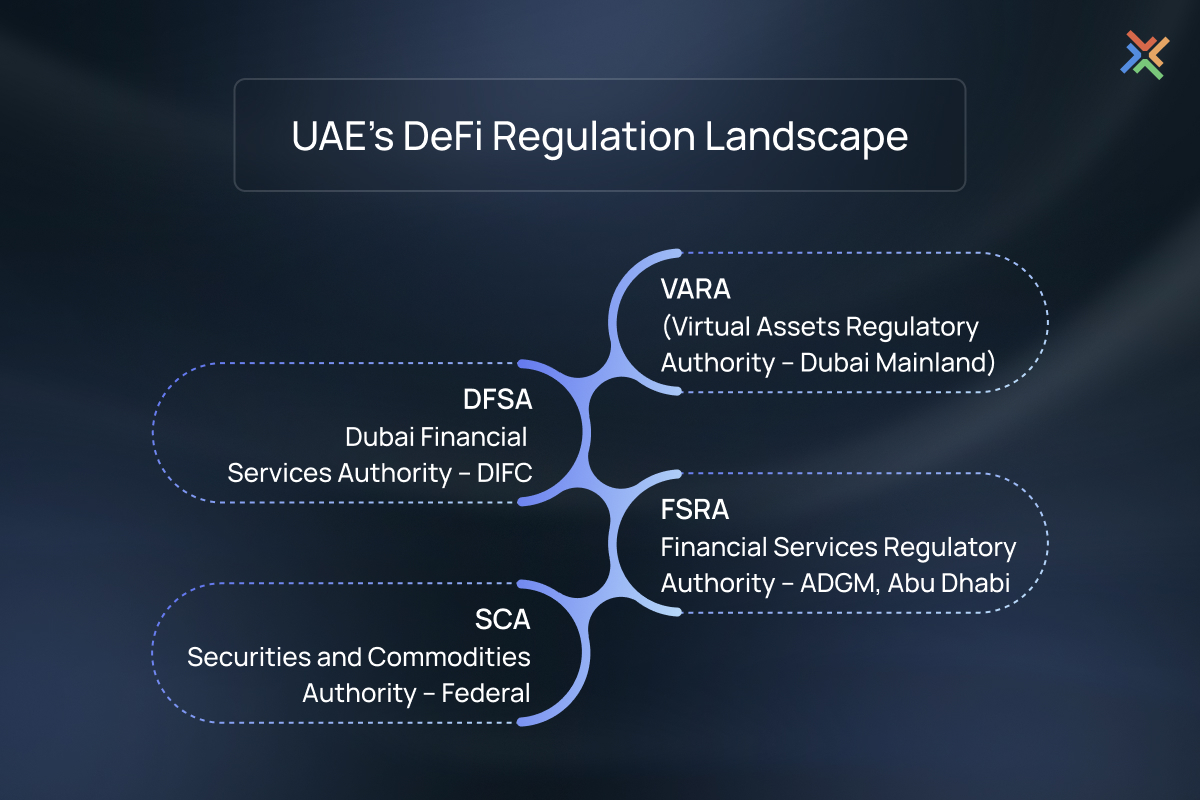
If you plan to build a DeFi product in the UAE, the first thing to understand is who regulates what. The country follows a zone-based model. Different authorities oversee DeFi, tokenization, and virtual asset activity depending on where a business is set up.
DeFi in the UAE is regulated by VARA in Dubai mainland, DFSA in the DIFC, FSRA in ADGM, and the SCA at the federal level. Each authority governs its own zone to ensure trust, compliance, and investor protection.
This approach may look complex at first, but it gives builders the freedom to choose a jurisdiction that fits their product and audience.
1. VARA (Virtual Assets Regulatory Authority – Dubai Mainland)
For DeFi platforms that operate in the Dubai mainland, VARA is the primary regulator. It oversees everything from token issuance and staking to lending platforms and decentralized exchanges.
VARA’s goal is to make digital finance safe for users. It focuses on investor protection, anti-money-laundering controls, and transparent marketing practices.
In recent years, VARA has also worked closely with the Securities and Commodities Authority (SCA) to create a smoother licensing path for projects that operate across multiple zones.
2. DFSA (Dubai Financial Services Authority – DIFC)
If your project is based inside the Dubai International Financial Centre, then the DFSA is your governing body. It manages digital assets and tokenized products that are offered to institutional or regulated clients.
The DFSA’s framework is built around governance and disclosure. It expects clear communication with investors, proper risk controls, and reliable technology.
That makes it suitable for regulated DeFi platforms or enterprises building tokenized assets.
3. FSRA (Financial Services Regulatory Authority – ADGM, Abu Dhabi)
For projects set up in the Abu Dhabi Global Market, the FSRA handles supervision.
It follows international standards issued by FATF and IOSCO and has built a transparent system for licensing and audits.
The FSRA places strong emphasis on operational integrity and compliance readiness. Because of this, ADGM often attracts institutional DeFi platforms and asset tokenization projects that need a globally aligned structure.
4. SCA (Securities and Commodities Authority – Federal)
At the federal level, the SCA ensures all zones follow consistent rules. Its cooperation agreement with VARA, signed in 2024, introduced a unified framework that connects Dubai and other Emirates under a shared compliance standard.
This helps startups and DeFi builders move faster without managing multiple licenses or duplicating regulatory checks.
The UAE doesn’t rely on one central rulebook. It has built a coordinated system that balances innovation with responsibility.
For anyone building in this space, it is important to partner with a blockchain development company in the UAE that understands how each regulator works and can design a DeFi product that meets local expectations from day one.
Where AI Supercharges DeFi
Artificial intelligence is becoming a core part of how DeFi products evolve. Across the fast-growing DeFi landscape, AI development services in the UAE are helping teams detect fraud, automate code reviews, analyze market behavior, and deliver more secure user experiences.
By combining automation with intelligence, builders can reduce risks, strengthen compliance, and improve how protocols operate at scale. In a region where trust and regulation matter as much as innovation, AI is turning DeFi into a more reliable financial model.
Here are some of the most practical ways it’s driving this shift.
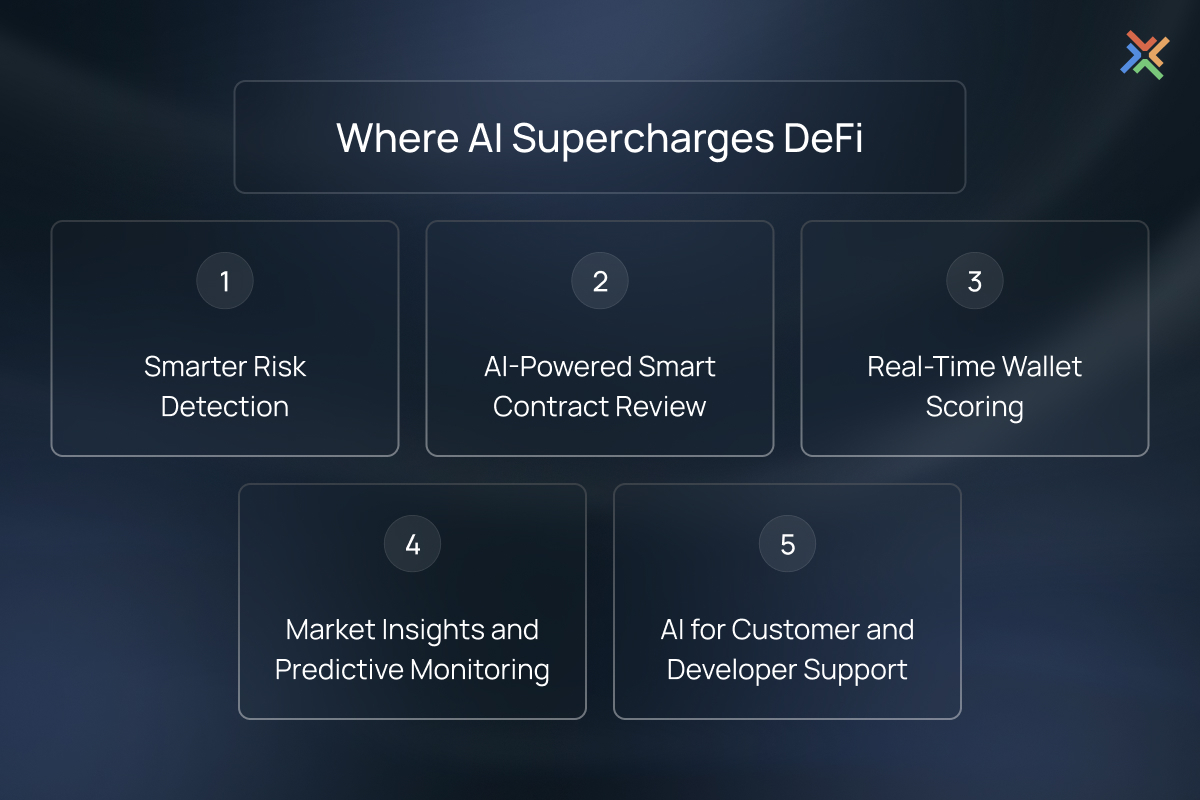
1. Smarter Risk Detection
DeFi platforms process thousands of transactions every day. AI systems can track this activity in real time and identify unusual behavior such as suspicious transfers or coordinated trading patterns. For founders, this brings early visibility into risks and stronger AML alignment from the start.
To see how these models work in practice, you can explore our AI development services in the UAE, which focus on building anomaly detection and compliance tools for blockchain products.
2. AI-Powered Smart Contract Review
Before deployment, every smart contract must be tested for vulnerabilities. AI tools trained on blockchain code can identify hidden bugs or logic gaps faster than manual reviews alone. This helps developers deploy secure contracts while cutting audit time, a key advantage when working within UAE’s regulated markets.
For deeper technical support, blockchain development services providers in the UAE help teams combine AI-assisted review with human audit expertise.
3. Real-Time Wallet Scoring
AI models can evaluate wallet activity to create a risk score before interaction. By studying transaction history and patterns, these systems flag high-risk addresses or wallets linked to previous exploits. This allows projects to block exposure before it occurs, keeping liquidity pools and tokenized assets more secure.
4. Market Insights and Predictive Monitoring
AI can interpret live blockchain data, liquidity flows, and user actions to highlight early signals of market change. Teams use these insights to manage liquidity, adjust token economics, or plan governance updates proactively. Decisions guided by real-time data improve platform stability and user confidence.
5. AI for Customer and Developer Support
AI assistants are becoming common inside DeFi ecosystems. They guide users through KYC steps, help troubleshoot wallet issues, and answer transactional queries instantly. For developers, AI support tools can also explain contract functions or automate basic checks, freeing time for higher-value work.
The UAE promotes innovation but expects accountability. By integrating AI into DeFi systems, builders can meet these expectations confidently. AI helps monitor transactions, review smart contracts, and automate compliance reporting, all the essential elements in gaining trust from both users and regulators.
Together, AI and blockchain form a foundation for DeFi that is transparent, auditable, and aligned with the UAE’s commitment to responsible growth. This is exactly what blockchain and AI development services in UAE are now enabling, helping businesses design smarter, safer decentralized solutions.
Building DeFi in the UAE – A Compliant Development Stack
Creating a DeFi product in the UAE goes beyond coding smart contracts or setting up liquidity pools. Every project must align with regulatory expectations set by authorities like VARA, DFSA, and FSRA, while maintaining high standards for data security and operational transparency. A well-designed tech stack helps achieve this balance, combining blockchain reliability with AI-driven monitoring and audit readiness.
Here’s what a compliance-ready DeFi build typically includes.
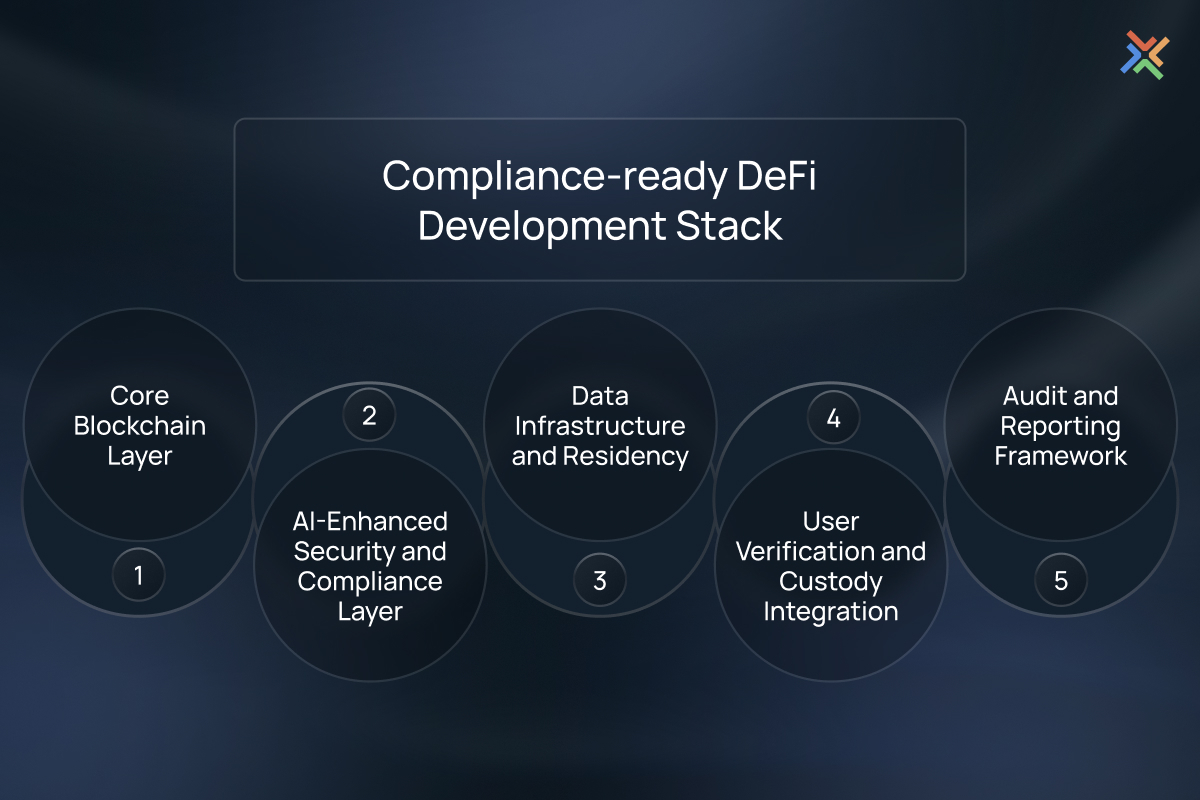
Core Blockchain Layer
At the foundation lies the blockchain network that powers transactions and smart contracts. Ethereum and Polygon remain popular for flexibility and community support, while networks like Avalanche or BNB Chain offer faster throughput for high-volume trading. Majority of UAE-based builders also use private testnets or permissioned variants to meet audit and residency needs before going live.
Smart contracts form the operational core. They automate lending, staking, or token distribution without human involvement. To ensure safety, these contracts should be reviewed using both manual audit processes and AI-assisted vulnerability scans before deployment, a best practice recommended by leading Blockchain Development Services in UAE.
AI-Enhanced Security and Compliance Layer
Modern AI Development Services in UAE are helping DeFi teams move beyond traditional code audits. AI models now form part of the compliance toolkit for DeFi platforms. They track user behavior, detect suspicious transactions, and alert teams about anomalies. In the UAE, where anti-money-laundering and know-your-customer rules are strictly enforced, AI analytics can flag risk patterns early and generate reports for review.
Integrating AI into the build process also allows faster pre-audit checks. This ensures projects meet internal standards before applying for licenses or external audits under VARA or DFSA oversight.
Data Infrastructure and Residency
For projects operating in the UAE, understanding data residency is crucial. Some regulators expect financial or customer data to remain within regional servers or approved cloud environments. Using local hosting options or regulated partners helps maintain compliance and makes audits easier.
Data pipelines should be encrypted end-to-end, with access logs for every API or wallet interaction. AI monitoring tools can further strengthen data governance by identifying irregular access or permission misuse.
User Verification and Custody Integration
Regulated DeFi applications often integrate digital identity and KYC systems. These tools verify users before they interact with smart contracts or staking pools. In the UAE, identity layers can also connect with licensed custodians who handle fiat conversions or secure token storage.
By embedding KYC and custody directly into the product architecture, projects built with Blockchain Development Services in UAE generate user trust and reduce manual overhead in compliance reviews.
Audit and Reporting Framework
Beyond pre-launch checks, DeFi platforms need continuous reporting once live. AI-based audit tools can monitor smart contract performance, transaction volumes, and protocol updates in real time. They help generate audit logs automatically, ensuring regulators and partners always have access to verified data.
This approach simplifies compliance renewals and positions the platform for sustainable growth under UAE’s evolving DeFi regulations.
A compliant DeFi stack is not just a combination of tools. It is an architecture built around security, traceability, and accountability. By combining blockchain with AI-driven monitoring, projects can maintain transparency from day one and meet the UAE’s standards for responsible innovation.
The right foundation helps builders move faster, stay audit-ready, and operate confidently within the country’s progressive regulatory ecosystem.
Costs and Timelines for DeFi Development in the UAE
Building a DeFi platform in the UAE involves more than development hours. The final cost depends on several variables, from protocol complexity and AI integration to regulatory scope and audit requirements. Because every project must align with frameworks defined by VARA, DFSA, or FSRA, budgeting early around these checkpoints helps avoid delays and hidden costs.
Here’s a practical look at how teams typically plan cost and delivery for DeFi development in UAE.
Understanding What Shapes Cost
The total investment for a DeFi product is shaped by its architecture, features, and compliance layer.
Key factors include:
Protocol design: Lending, staking, or DEX models require different smart contract logic.
AI integration: Fraud detection, compliance automation, and smart contract review tools add technical depth.
Audit requirements: Independent reviews, penetration tests, and continuous monitoring influence both time and cost.
Regulatory preparation: Licensing documentation, VARA alignment, and AML/KYC integrations need early planning.
Projects built with Blockchain Development Services in UAE tend to prioritize compliance and automation early, which helps control post-launch adjustments later.
Typical Budget Range
While every project is unique, the following estimates reflect average market ranges in 2025 for UAE-based DeFi projects:
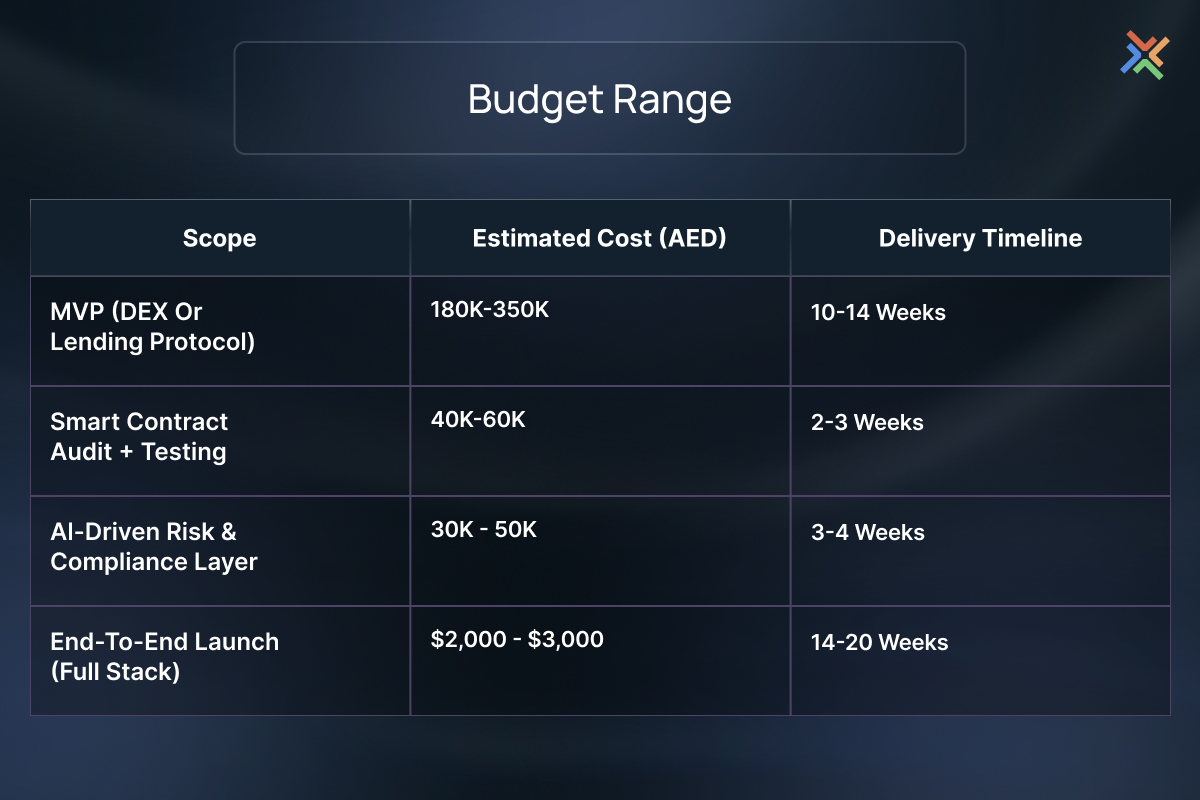
These ranges assume an initial product scope, limited governance complexity, and standard licensing readiness.
Custom builds that include AI Development Services in UAE for predictive monitoring or anomaly detection typically sit on the higher end due to added infrastructure and training time.
Timeline Breakdown
A typical DeFi project in the UAE moves through five key stages:
Discovery and Planning (2 weeks)
Define product scope, token model, and regulatory zone (VARA, DFSA, or FSRA).
Architecture and Smart Contracts (4–6 weeks)
Build and test contracts for functionality and logic accuracy.
AI and Compliance Integration (3–4 weeks)
Deploy AI modules for wallet scoring, fraud alerts, and audit tracking.
Security Testing and Audit (2–3 weeks)
Combine manual review with AI vulnerability checks before final deployment.
Launch and Post-Launch Monitoring (2–3 weeks)
Deploy to mainnet and activate continuous compliance monitoring.
This phased approach keeps delivery predictable while ensuring DeFi compliance in UAE remains intact throughout the build.
Building DeFi in the UAE requires precision and planning. Clear cost visibility and timeline discipline are just as important as technical skill. By integrating AI Development Services in UAE and Blockchain Development Services in UAE from the start, teams can shorten delivery cycles, reduce rework, and stay aligned with local compliance.
The result is a platform that is not only functional and scalable but also trusted by regulators and investors alike.
Building the Future of DeFi in the UAE
AI Development Services in UAE are helping shape a smarter layer of decentralized finance. By embedding analytics and automation into DeFi systems, they make platforms more adaptive, compliant, and ready for real-world scale.
With Blockchain Development Services in UAE, that intelligence gains a reliable foundation. Secure frameworks, transparent records, and verifiable transactions ensure every product is built on trust, the core of sustainable growth in the UAE’s digital economy.
DeFi in the UAE will continue to thrive where innovation meets accountability, and where every build begins with clarity and purpose. If you’re ready to turn that vision into a compliant, scalable DeFi solution, WDCS is here to help. Connect with us today.
Develop secure, audit-ready DeFi systems with WDCS for transparent, trusted growth.
Our team blends AI intelligence with blockchain engineering to build solutions that meet UAE compliance goals while supporting scale. Partner with WDCS to bring clarity, security, and accountability to every layer of your DeFi architecture.